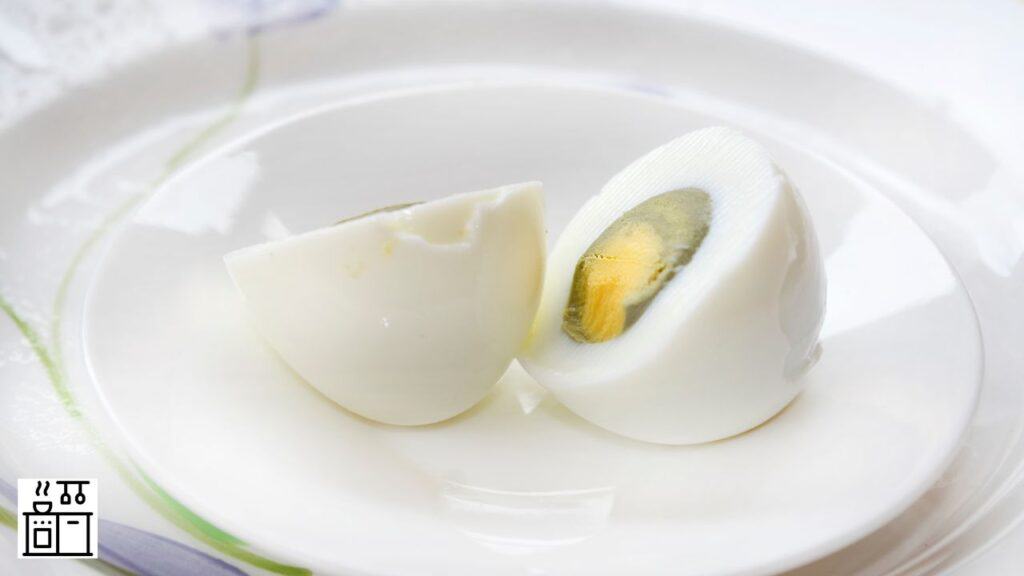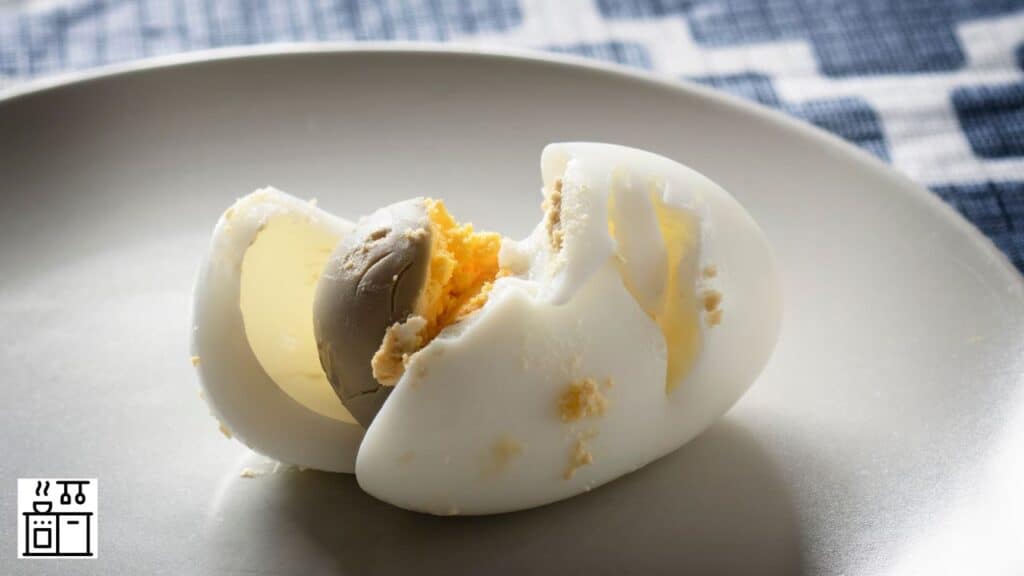Hard-boiled eggs have grey yolk because of the chemical reaction between sulfur present in the egg white and iron in the egg yolk. When these two substances react, they form ferrous sulfide at the surface of the yolk. This results in a greenish-grey ring around the egg yolk.
The occurrence of grey yolks is often attributed to overcooking the eggs or using cooking water that has a high concentration of iron. While the grey color might make the eggs less visually appealing, they are perfectly safe to eat.
This common phenomenon should not deter you from enjoying your hard-boiled eggs.
Chemical Reaction that Causes Grey Yolks in Hard-Boiled Eggs
Let’s now see in detail what causes the grey color in hard-boiled egg yolks.
The egg is made up of two main parts – the yolk and the white. The yolk contains iron, while the white contains sulfur.
When you cook an egg, the heat causes the sulfur in the white and the iron in the yolk to react together.
This reaction forms a compound known as ferrous sulfide (also known as iron sulfide), which is dark in color.
Now, you already know that the yolk of an egg is yellow. So, when this dark-colored iron sulfide mixes with the yellow yolk, it creates a greenish-grey hue, which is what you see in a hard-boiled egg.
To give you a visual, it’s like mixing black paint with yellow. The result is a dark greenish color, right? The same principle applies here.
However, don’t let the color of the egg yolk put you off. It doesn’t affect the taste or nutritional value of the egg. It’s simply a natural chemical reaction that happens when eggs are cooked.
Factors that Contribute to Grey Yolks in Hard-Boiled Eggs

Overcooking, high temperatures, long storage before cooking, iron content in the cooking water, and cooking in an iron pan all contribute to creating grey yolks in hard-boiled eggs.
Let’s break these factors down:
- Overcooking: When you cook your eggs for too long or at too high a heat, the sulfur and iron in the egg yolk react more. This leads to the formation of a grey layer. It’s like leaving a cake in the oven for too long, it will end up burnt and unappealing.
- High Temperatures: Think of it like a boiling pot. The hotter it gets, the faster things cook and change. The accelerated reaction between the egg whites and yolks at high temperatures can result in a grey yolk.
- Long storage before cooking: It’s a bit like leaving a banana out on the counter. Over time, it turns brown. Similarly, if eggs are stored for a long time before cooking, the pH levels in the egg yolk can increase, contributing to the formation of grey yolks.
- Iron content in cooking water: Just as drinking water with high iron content can leave a metallic taste in your mouth, cooking eggs in such water can increase the iron available for the chemical reaction, leading to a grey color.
- Cooking in an iron pan: Using an iron pan for cooking eggs can also increase the iron content in the cooking environment, contributing to the formation of grey yolks.
How to Prevent Grey Yolks in Hard-Boiled Eggs?
Let’s now talk about how to keep your eggs looking appetizing and free from the unappealing grey yolks.
Here’s how to avoid grey yolks in hard-boiled eggs.
First up, don’t overcook your eggs. Simmer them, don’t boil them. This reduces the chemical reaction between sulfur and iron, which is what causes those off-putting grey yolks. It’s all about finding that sweet spot of the right temperature and duration.
Once your eggs are done cooking, cool them quickly. You can run cold water over them or dunk them in a bowl of ice water. This stops the chemical reaction in its tracks and keeps the yolk yellow.
Next, store your hard-cooked eggs in their shells in the refrigerator. You can keep them for up to a week, and they’ll still be good to go. This step also helps in maintaining the bright yellow yolk color.
Also, try to use fresh eggs whenever you can. The fresher the egg, the less likely it is to turn grey. This is because fresh eggs have lower pH levels in the yolk.
Lastly, avoid cooking your eggs in iron pans. Iron can contribute to the formation of grey yolks. Opt for non-iron cookware when boiling your eggs.
By following these tips, you can say goodbye to grey yolks and hello to appetizing, delicious hard-boiled eggs.

